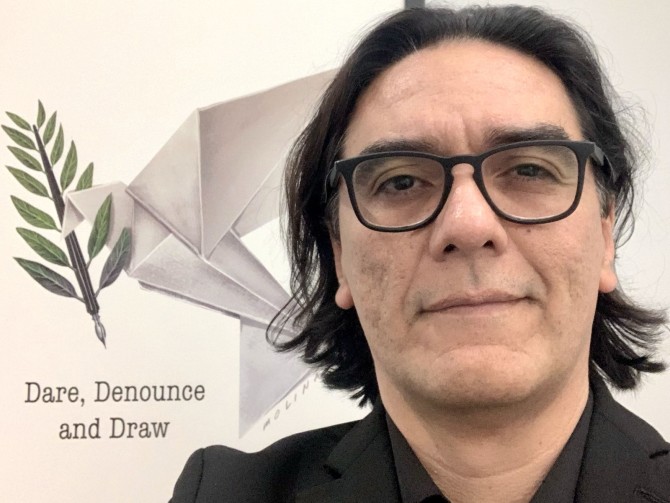To mark this freedom of expression theme year, Global Cornell presents a three-part series profiling the challenges and successes of Cornell's scholars under threat, written by Afghan journalist Fatima Faizi. When she fled Afghanistan in August 2021, Faizi was a correspondent for the New York Times and Al Jazeera. Today she is a student at Columbia University's School of General Studies in New York City.
Nicaraguan political cartoonist Pedro X. Molina may be more than 2,000 miles from his homeland, but his daily work of skewering Nicaragua's dictatorship goes on from Ithaca.
Through the independent newspaper Confidencial, he comments on events unfolding in his country, his pen refusing to be stifled by borders. He files a cartoon of the day for Nicaraguan audiences and cuts U.S. and world leaders down to size three times a month as a syndicated artist for Counterpoint.com.
"My body is here, but my heart and my work are still entrenched in the struggles of my people," Molina said.
As an energetic voice of dissent, Molina was a target for the Nicaraguan government, and he and his family were forced to flee in December 2018. He arrived in New York with little more than a suitcase and a portfolio of his artwork.
"It was not a choice but a necessity," Molina said, reflecting on the harrowing decision to leave his native country. "To stay meant to silence my voice, to negate my existence."
Working with Ithaca City of Asylum (ICOA), Molina eventually secured a visa and spent two years as a visiting scholar at Ithaca College. Molina transitioned to Cornell in fall 2021with the help of an Artist Protection Fund fellowship from the Institute of International Education (IIE) and support from Global Cornell.
He spent two years as an APF fellow in residence and remains a visiting critic at Cornell's Latin American and Caribbean Studies Program, part of the Mario Einaudi Center for International Studies.
Molina's journey to the United States was not an easy one, but he says luck was on his side. "I was amazed by the generosity of strangers," Molina said.
Molina's time at Cornell marked a pivotal chapter in his story. He had the opportunity to teach and share his experiences with a new generation of students and to connect with a broader academic community. He says his experience as a visiting scholar fueled his creativity, amplified his message for a global audience and helped him build a local network.
"I was not only teaching but also getting in touch with other colleges nearby, because Cornell has ties with several of these colleges," he said.
Based on his experience, he has some advice for scholars under threat beginning their journey: "Cornell is a great place to meet interesting people and make connections. Make sure you do that."
Liberty is not a permanent state. It is a delicate achievement to value and protect every day.
Pedro X. Molina
For Molina, Cornell ultimately became more than a workplace. It has been a supportive community that stands by him. The university has offered crucial support as he navigates the intricacies of the U.S. immigration system and helped him manage the legal and bureaucratic challenges that come with seeking asylum.
Cornell's assistance has been instrumental in his adjustment to a new life in the United States, he says, making it possible for him to continue his advocacy and artistic expression with less looming worry about immigration issues.
Molina's cartoons offer piercing insight into world politics and the situation back home. During his time in Ithaca, Molina has become a prominent voice in the Nicaraguan diaspora, using his platform to advocate for human rights and freedom of expression.
And the worldwide acclaim for his work continues to grow.
Molina received the 2021 Gabo Award for Excellence, one of the most prestigious journalism prizes in Latin America. In 2023 he was honored with the Václav Havel International Prize for Creative Dissent recognizing top artists who use their work to speak out against oppression.
"I consider myself extraordinarily fortunate," Molina said. "Unlike many refugees, I have the unique privilege to work in an area I am passionate about. And I owe that to ICOA and its community partners, Ithaca College - and of course, Cornell."
As Molina's work has gained attention outside Nicaragua, he has shared his story in speaking engagements and his art has been featured in numerous exhibitions and publications. Most of all, Molina remains committed to using his talents to make a difference in the world.
"My work aims to underscore the fact that liberty is not a permanent state." he said, "It is a delicate achievement to value and protect every day, because it is constantly under threat."
Fatima Faizi is a freelance writer for Global Cornell. Read the first Defying the Odds story. Watch for the third story in April.









